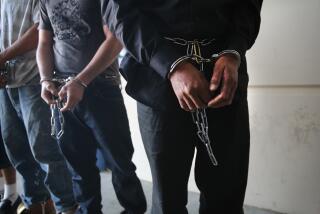Jury System Reform Plan Draws Fire
- Share via
SACRAMENTO — A proposal to improve California’s jury system by paying jurors up to $50 a day, establishing a day-care program for their children and paying other expenses drew criticism Monday at a legislative hearing as very costly.
The proposal was described as necessary to attract high-quality jurors at a time when many are staying away and to reform a system that, in key areas, has remained the same for almost 40 years.
The recommendations were made by the state Judicial Council, the administrative agency for the state’s courts.
The council’s proposal to increase the $5-a-day payment that jurors currently receive highlighted a legislative hearing called to examine a wide-ranging list of proposed jury reforms.
“It is insulting to tell jurors that, in return for their service, the state will compensate them at a rate of $5 per day,” the council said in a 183-page report distributed to the judiciary committees of the Senate and Assembly.
“It’s not enough to buy lunch,” testified Clark Kelso, a Sacramento law professor and the report’s primary author.
The council noted that the $5 payment to jurors and a 15-cent-a-mile reimbursement for travel to--but not from--the courthouse has remained unchanged since 1957.
As part of a package to make jury service more attractive and less of a financial hardship, the council proposed paying jurors $40 a day after the first day they serve and up to $50 after the 30th day.
The report also urged an increase in travel allowance to 28 cents a mile to and from the courthouse, establishment of child care for jurors whose service would require them to make special arrangements and reimbursement up to $5 a day for juror parking.
Additionally, the council urged that jurors be provided free transportation on public transit systems for on-duty commuting.
The council’s plan drew fire from the Legislature’s nonpartisan budget analyst, who warned that it would cost $89 million a year statewide during an era of tight government budgets. This would be an increase of $71 million over what taxpayers spent two years ago for jury fees and mileage.
The increased cost would be divided between general taxpayers, civil litigants and, in a new financing twist, the state’s disability system, the legislative analyst said.
Citing the use of the disability system--which pays employees who cannot work because of an injury or other disability--Craig Cornett, a deputy legislative analyst, told the committee it would be a “very major change in policy for jury service to be considered a disability.”
In the aftermath of the O.J. Simpson criminal trial, the Legislature last year struggled to find ways to reform the jury system, which critics claim has been in crisis for years.
Lawmakers approved some piecemeal changes, but kicked the issue of comprehensive reform to the 1997 session, where it seems certain to face an uphill fight.
Kelso, the report’s author, said jury service in California amounts to a “very odd tax” because citizens are required to take time from their personal lives and jobs to perform an important public service, but receive only $5 a day in compensation.
Kelso noted that jurors in federal courts are paid $40 a day. He said New York recently adopted a $40 fee in state courts that will be implemented in gradual steps.
Assemblywoman Debra Bowen (D-Marina del Rey) questioned whether better pay would encourage people to serve and discourage complaints of economic hardship.
Bowen said she served as a juror last year in Santa Monica and the biggest complaint of fellow jurors was not low pay, “but the amount of time you spend sitting around . . . and wasting time.”
More to Read
Get the L.A. Times Politics newsletter
Deeply reported insights into legislation, politics and policy from Sacramento, Washington and beyond. In your inbox twice per week.
You may occasionally receive promotional content from the Los Angeles Times.









